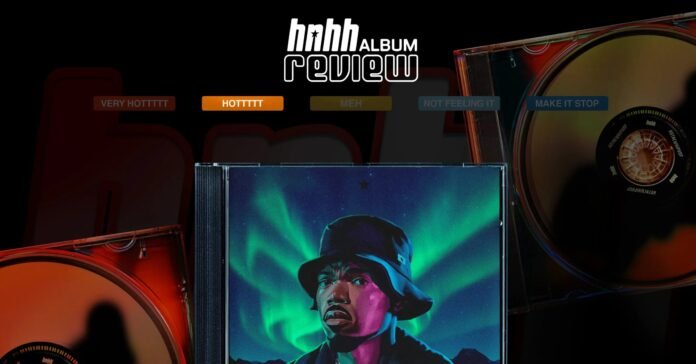The Fleeting Nature of Stardom
Stardom is a fleeting concept, often experienced as a rollercoaster ride for artists who find themselves under the relentless gaze of the public. The pressures of fame can be overwhelming, leading to scrutiny that often has little to do with an artist’s actual work. This scrutiny can push artists to prove their worth to a fickle fanbase, one that may abandon them at the slightest hint of a misstep or a new trend. The downward spiral into obscurity is rarely immediate; it unfolds gradually, often over months or even years.
Chance The Rapper: A Case Study
For Chance The Rapper, the journey between his debut album, The Big Day, and his sophomore effort, Star Line, has been fraught with challenges that have cast doubt on his standing in the hip-hop landscape. Following the monumental success of Coloring Book, Chance underwent a transformation, embracing a more family-oriented and faith-driven persona. This pivot was understandable for a young artist navigating the temptations of the music industry, but it also distanced him from the carefree, high school stoner image he cultivated in his breakout mixtape, Acid Rap.
However, the path hasn’t been smooth. From a widely circulated video of him celebrating Carnival to his public split from the mother of his two children, and a $3 million lawsuit involving his former manager, Chance has faced a barrage of challenges. These experiences have undoubtedly shaped Star Line, making it feel like both a return to his roots and a testament to his resilience.
Ambition and Cultural Roots
The title of Star Line itself signals ambition, drawing inspiration from Marcus Garvey’s Black Star Line, a shipping line central to Garvey’s Back-to-Africa movement. Chance’s travels to Africa, particularly Ghana, and Jamaica, anchor this latest body of work while paralleling the struggles faced back home in Chicago. The meditative backdrop of “No More Old Men,” featuring Jamila Woods’ ethereal vocals, allows Chance to reflect on generational shifts and the socio-cultural challenges that young people in Chicago encounter without proper guidance.
In a similar vein, “The Negro Problem” offers a sobering look at systemic issues confronting Black Americans. Chance’s poignant lyrics, “The judge said, ‘What? I don’t see no problem’ / the world said, ‘Yup, that’s the negro problem,’” highlight the urgent need for empathy and awareness regarding Black struggles. BJ The Chicago Kid’s emotive vocals amplify this message, grounding it in both artistry and social consciousness.
Addressing Systemic Issues
Chance has consistently addressed social issues in his music, but Star Line goes further by offering actionable reflections rather than mere gestures aimed at appeasing the white gaze. The fiery track “Letters” sees Chance, a devout Christian, targeting mega-churches and the exploitation of religion. The intensity builds across three verses, colliding imagery of Bibles and firearms, creating a powerful critique of religious institutions.
“Just A Drop,” featuring Jay Electronica, delves into themes of scarcity and human rights, drawing parallels between displacement in Chicago and the ongoing struggles in Palestine. Jay Electronica’s spiritually-infused verse channels these ideas through Biblical references and nods to the Nation of Islam, navigating controversy while emphasizing resistance against oppression. These moments showcase Chance’s growth, as he applies hyper-focused observations to a broader societal context, aligning with the album’s title and embracing a pursuit of justice.
Personal Grief and Emotional Depth
The six-year gap since The Big Day allows Chance’s personal grief to surface in Star Line. On the minimalist track “Link Me In The Future,” he mourns lost loved ones, while “Pretty” confronts themes of loneliness and divorce with stark honesty. Lines like, “Sometimes I think she was the love of my life / So, when I’m alone sometimes I think that I’m dead,” reveal a vulnerability that starkly contrasts the celebratory tone of his previous album. This raw honesty is what allows Star Line to resonate deeply with listeners.
Balancing Emotion with Energy
Amidst the emotional and political weight, Chance doesn’t shy away from delivering bangers and bars. “The Highs & The Lows” features an excellent lyrical exchange with Joey Bada$$, while Chicago’s rising talent BabyChiefDoIt delivers a standout verse on the drill track “Drapetomania.” Collaborations with Young Thug and TiaCorine on the pop-leaning “Gun In Yo Purse” showcase a diverse sound palette, while “Burn Ya Block” channels Jamaican influences, reminiscent of Kanye West’s Yeezus rather than traditional dancehall.
A Natural Progression
Star Line represents a natural progression from the missteps of The Big Day. It serves as both a return to form and an evolution, building upon the foundation Chance has created while asserting a broader, more mature worldview. At its core, the album revolves around lifelong struggles for love, justice, and self-definition. While Chance The Rapper may never replicate the acclaim of Coloring Book, the numbers and narratives fade in comparison to a work that prioritizes clarity, cohesion, and a purposeful step forward. In Star Line, Chance charts the difficult terrain of love, justice, and selfhood, crafting an album as restless and resolute as he is.

